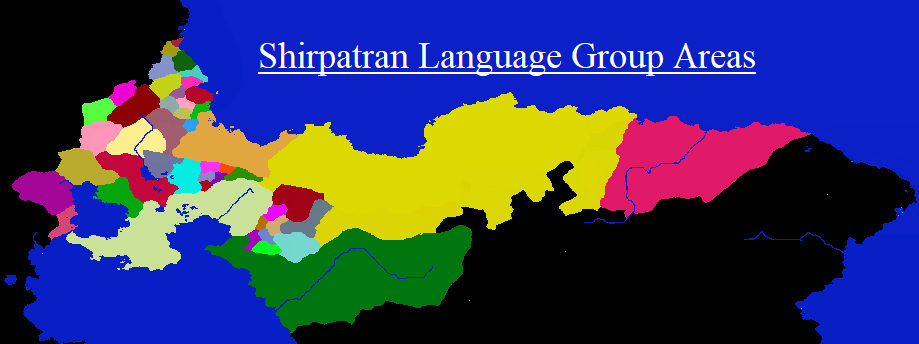Shirpatran Language (Sher-pot-trin)
The Shirpatran language group is a group of dialects associated with North-central Samvara - more specifically, the Empire of Shirpatra and its co-religious neighbors. Generally speaking, Shirpatran languages share common roots with Shenek Languages; while the two aren't mutually intelligible, a Shirpatran speaker would recognize a number of similar words and intuitively understand the grammar.
The Shirpatran language group was formed as a common tongue of those communities in the Northern plains that all followed the guidance of the Goddess Aysha. This hybrid language was originally a compromise among tribes, a sign of common ground and equal status. Over time, it became associated with imperial power, and ultimately displaced or absorbed many other languages in Northern Samvara. Ayshan priests and missionaries often consider Shirpatran language to be an essential component of education, to better access the written traditions of the Ayshan religious thinkers, and so Shirpatran tends to be a scholarly and courtly language wherever Ayshan religion dominates.
Shirpatran language is rather unique in that it was made to better imitate and accommodate Solar communication. Solars are telepaths who communicate through images, emotions, and ideas; it takes active practice for Solars to learn to repackage their thoughts into verbal language. While Shirpatran obviously cannot replicate solar telepathy, it has been shaped to more easily communicate things that solars consider valuable (specific emotional states, intensity of light). This has also shaped the nature of Shirpatran naming.
Shirpatran names come in a few varieties. The first are traditional names, which use older language to separate the shape of the word from the meaning:
Shirpatran Names
- Jeru (awake)
- Rosha (light)
- Tyala (shimmer)
- Cho (bright)
- Byuda (dim/gentle)
- Burja (dawn-borne)
- Boyd (dusk)
- Toria (starry)
- Tay (ray)
- Chesh (flash)
- Sitspara (clear-soul)
- Sulva (comet)
- Todni (constellation)
- Gralta (keeper of the spheres)
- Uttui (the North Star)
- Magna (the red star)
- Braka (the bright star)
- Zuri (summer)
- Dula (warm)
- Ermali (majesty)
- Ninashuja (graceful worship)
- Uteg (perfection)
- Jonia (curiosity)
- Shoka (powerful)
- Ashai (wonder)
- Karita (love)
- Sheva (purity)
- Svirin (freedom)
- Ordessa (mercy)
- Pratama (the promise)
- Artaba (good person)
- Kosho (sacred)
- Harret (quick-handed)
- Gelshema (shield of fire)
- Dorelvi (the day master)
- Pralisa (reflection)
- Gyama (sheen)
- Saida (beauty)
- Shaiv (calm)
- Kisha (horizon)
- Burua (twilight)
- Kutuvi (destiny)
- Vingan (ponder)
- Sedigel (harmony)
- Harmony
- Purpose
- Clarity
- Grace
- Restraint
- Felicity
- Glory
- Courage
- Esteem
- Devotion
- Comfort
- Justice
- Faith
- Sacrifice
- Fidelity
- Tenacity
- Credence
- Acceptance
- Anguish
- Beauty
- Serenity
- Joy
- Purpose
- Candor
- Patience
- Valor
- Mercy
- Prudence
- Balance
- Destiny
- Merit
- Honor
- Ernest
- Temperance
- Truth
- Honesty
- Joyful-Anticipation
- Rejoicing-at-Dawn
- Discovering-Purpose
- Midday-Heat
- Shock-of-Recovery
- Considering-Endlessness
- Momentary-Peace
- Barely-Askew
- Fear-of-Revelation
- Aspirational-Reflection
- Farewell-Melancholy
- Conversational-Politeness
- Declaring-Faith
- Sleepless-Awakening
- Anxiety-Leaving-Home
- Bora: a very common human last name
- Haro: a very common dryad last name
- Shika: a very common prism last name
- Sivin: a generic name for kobolds
- Tiseel: a common name for half-dryads
- Moru: a common name for half-prisms
- Toku: miller
- Letti: smith
- Darjo: tailor
- Jeka: weaver
- Minig: clerk
- Kobi: hunter
- Rozto: cook
- Shara: brewer
- Loda: woodsman
- Nauli: servant
- Ninbari: generic name often given to incoming immigrants
- Dagsi: a generic name given to former Aretans
- Gelsi a generic name given to former Pratasa
- Kolsi: a generic name given to former Halikvar
- Cheka: sugar-worker
- Tayburi
- Kariburi
- Kutuburi
- Jonaburi
- Kishaburi
- Dulaburi
- Pabari: an old Shirpatran family
- Kisudra: an old Shirpatran family
- Noktiba: an old Shirpatran family
- Suluba: an old Shirpatran family
- Tokija: an old Shirpatran family
- Kozeli: princely family
- Pasuwara: an original Suwirshan family
- Of-Founders
- Of-Moonlight-East
- North-Star
- Sun-Path-West
- Of-Ponder
- Tower-Keeper
- Book-Keeper
- Gold-Keeper
- Water-Guided
- Cloudless-Sky
- Dusk-Walker
- Dawn-Walker
- Sand-Walker
- Mountain-Walker
- Tree-Walker
- Stone-Builder
- Faithful-Guard
- Light-Bearer
- Fire-Guide
Root Languages
Remove these ads. Join the Worldbuilders Guild




Comments